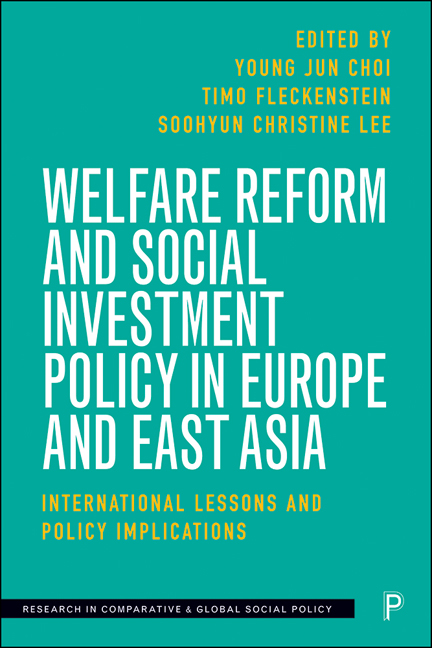Book contents
- Frontmatter
- Contents
- List of figures and tables
- Notes on contributors
- Acknowledgements
- Preface from the series editors
- 1 Introduction: social investments and welfare reform in Europe and East Asia
- 2 Work–family policy expansion and the idea of social investment: the cases of Germany, England, South Korea and Japan
- 3 Private education in South Korea: lessons for the West from past mistakes?
- 4 How do family background and shadow education affect academic performance and labour market outcomes in South Korea? Reasons for redistributive social investment
- 5 Employability, higher education and the knowledge economy
- 6 Does social investment make the labour market ‘flow’? Family policies and institutional complementarities in Italy, Spain, Japan and South Korea
- 7 The social investment approach and gender division of housework across East Asia and Europe
- 8 Employment outcomes of social investment in latecomer countries
- 9 Estimation of the human capital depreciation rate: an international comparison and policy implications in South Korea
- 10 Changing patterns of grandparenting and their implications for active ageing in England and South Korea
- 11 The governance of social investment policies in comparative perspective: long-term care in England and South Korea
- 12 Towards greater social investments and equality in Europe and East Asia: policies and politics
- Index
7 - The social investment approach and gender division of housework across East Asia and Europe
Published online by Cambridge University Press: 21 December 2021
- Frontmatter
- Contents
- List of figures and tables
- Notes on contributors
- Acknowledgements
- Preface from the series editors
- 1 Introduction: social investments and welfare reform in Europe and East Asia
- 2 Work–family policy expansion and the idea of social investment: the cases of Germany, England, South Korea and Japan
- 3 Private education in South Korea: lessons for the West from past mistakes?
- 4 How do family background and shadow education affect academic performance and labour market outcomes in South Korea? Reasons for redistributive social investment
- 5 Employability, higher education and the knowledge economy
- 6 Does social investment make the labour market ‘flow’? Family policies and institutional complementarities in Italy, Spain, Japan and South Korea
- 7 The social investment approach and gender division of housework across East Asia and Europe
- 8 Employment outcomes of social investment in latecomer countries
- 9 Estimation of the human capital depreciation rate: an international comparison and policy implications in South Korea
- 10 Changing patterns of grandparenting and their implications for active ageing in England and South Korea
- 11 The governance of social investment policies in comparative perspective: long-term care in England and South Korea
- 12 Towards greater social investments and equality in Europe and East Asia: policies and politics
- Index
Summary
Introduction
Since the 1990s, the idea of social investment, which advocates the modernisation of welfare systems for sustainable social and economic development by highlighting human capital development, has influenced European welfare states (Jenson and Saint-Martin, 2003). Demographic structural changes have created a need to harvest human resources to enhance employability, and the modernisation of social policy has focused on human capital development of the young (Esping-Andersen et al, 2002). Peng (2014), among others, has argued that the idea of social investment has expanded beyond Western countries. Both Japan and the Republic of Korea (hereafter Korea) have developed social policies to support and incentivise the productive sectors. Those previously left out of the welfare system – women, children, and the elderly – have become targets of social spending.
Although what the social investment approach actually means may vary across East Asia and Europe, just as social investment policy configurations vary, in all countries, social policy changes are significant macro-level factors with implications for changes in the gender division of labour in the private sphere, not least because the idea has been influential in policy interventions targeting the family.
The gender gap in the division of housework has narrowed in most advanced economies (Gershuny, 2000; Gornick and Meyers, 2003; Ellingsaeter and Leira, 2006; Hook, 2006), but women still do the lion's share of housework. The strongly gendered division of labour at home is even more problematic in East Asia. On average, women in East Asian societies spend three to four times more than men doing unpaid work, including household chores and care for the family. The daily proportion of time allocated by men to unpaid work was 4.7 per cent and 3.0 per cent in Japan and Korea respectively, compared to 15.3 per cent and 13.7 per cent for women (OECD, 2020a). Unfortunately, the gap continues to exist despite significant policy interventions in East Asia.
Criticisms of social investment include concerns about gender equality. For example, Jenson (2009: 446) argued that women's demands for equality and attention to their needs are sidelined in favour of the interests of young girls’ futures. Others have suggested this is a neoliberal strategy that does not fully address the right to care and maintains an ambiguous stance to the family (Bothfeld and Rouault, 2015; Saraceno, 2015).
- Type
- Chapter
- Information
- Welfare Reform and Social Investment PolicyInternational Lessons and Policy Implications, pp. 167 - 188Publisher: Bristol University PressPrint publication year: 2021

